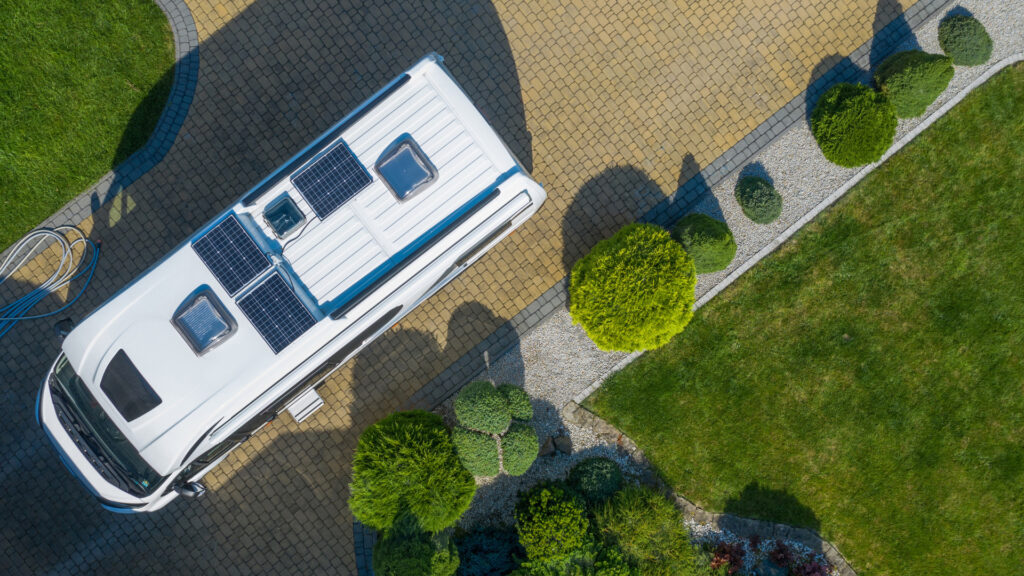Table of Contents Show
An RV air conditioner is essential if you plan to spend time in your RV during warmer weather. However, you don’t want to trust just any air conditioner to keep you and your rig cool.
A ducted RV air conditioner for your rig will give you the best chance of staying comfortable in your rig. You’ll appreciate all it can do when you’re not sweating while trying to fall asleep at night.
So what does a ducted AC mean in an RV, and how does it work? Let’s dive in and see!
What Is a Ducted RV Air Conditioner?
A ducted RV air conditioner is similar to a central air system in a home. The AC unit connects to a ducting system that runs throughout the inner workings of the RV’s structure.
A ducted RV air conditioner doesn’t pump cool air out of the unit and into a single space. It pushes the cool air through the ducts and evenly distributes the cool air throughout the rig.
Many of these units have a “dump” feature where an RV can close off the vents, and the unit will dump the cool air into the room with the A/C unit.
They come in different sizes but can do an incredible job of keeping you and your RV cool while camping in warmer weather.
- Remote control with cooling, dehumidifying, dry, sleep, timing, and other functions (stored inside AC unit display for...
- Temperature control for rooms up to 835 square feet
What Are the Benefits of a Ducted RV Air Conditioner?
There are several reasons why a ducted RV air conditioner is an appealing option for an RV. Let’s look at some of the benefits RVers enjoy about having a ducted RV air conditioner.
More Control of Airflow
One of the best features of a ducted AC is that you can control airflow. If you find one room colder than the rest, close a vent or two in that room.
This will allow more air to travel to the other vents throughout your RV. Having the air dispersed throughout the rig provides a more consistent temperature as you move from one space to another.
If you return to your RV and find that the main living space is warmer than you’d like, you can open the dump vents on the air conditioner. This will push the bulk of the air into the main living space and a minimal amount to the vents.
By doing this, you can quickly cool down your main living space. The vents are great to use when cooking and creating a tremendous amount of heat in the living space.
Quieter
RV air conditioners can be incredibly noisy and make it difficult to get a good night’s sleep. However, ducted RV air conditioners are substantially quieter than standard A/C units for an RV.
If you like it to be as quiet as possible while you sleep, a ducted A/C unit will be several decibels quieter than other units.
You’ll want a good night’s sleep while RVing so you can wake up fresh and ready for whatever the day’s adventures.
Pro Tip: If you need a super quiet AC, be sure to read This Is the Quietest RV Air Conditioner on the Market!
Humidity Control
Humidity can be very dangerous and destructive to the inside of an RV. It can create an ideal breeding environment for mold and other growing bacteria.
You must keep your humidity levels in check to protect your rig. A ducted RV air conditioner will suck the humidity out of the air while you run it.
If you’re traveling in your RV during the rainy season or in an area with high humidity, you’ll want to run your AC unit regularly to help battle the moisture.
In addition, it’s also a good idea to use dehumidifiers throughout your rig to capture as much moisture as possible.
- 13-PINT DESICCANT DEHUMIDIFIER – Highly Efficient Desiccant Rotor Removes Moisture, Odors & Mold While Warming Ambient...
- LIGHTWEIGHT BUT POWERFUL – Enjoy Adjustable Humidity Control & Whisper Quiet Operation for Small Spaces Up to 270...
Cheaper Repairs
The more you use your RV, the more likely something will break, including the air conditioner.
Luckily, many RVers find that ducted A/C units are cheaper for repairs. This is because they’re less likely to fail as often as the cheaper non-ducted versions.
The parts on these units are more likely to withstand regular use. This means you won’t have to worry about paying for parts or calling a service technician to work on your rig.
Keep in Mind: Protect your RV Air Conditioner with an AC cover! These are the 6 Best RV AC Covers on the market.
What Are the Disadvantages of a Ducted RV Air Conditioner?
While ducted RV air conditioners may be the best option, they’re not perfect.
There are a few disadvantages that you should be aware of for ducted RV air conditioners. Let’s take a look!
Collects More Dust
Ducted RV air conditioners can collect a tremendous amount of dust. That can be especially problematic if you’re allergic to dust.
If you have a ducted RV air conditioner, you’ll need to stay on top of cleaning the filters to keep the dust out of the air and help the unit run efficiently.
When it comes to collecting dust, non-ducted units simply collect substantially less dust.

Ducts Require More Space
You’re typically only seeing ducted RV air conditioning units in larger units. That’s because they require a lot of space to run ducting and other essential components.
Any vent for heating or cooling will need a duct running from the A/C unit to wherever it’s delivering the cool air. The larger the rig, the longer the vent will need to be. While a ducted system may be more convenient in some instances, it’s not the right solution for every RV.
Pro Tip: If you’re worried about the height of your rig, you can cut down a few inches with a low profile AC. Check out these Low Profile RV Air Conditioners That Actually Work!
Replacing Unit Can Be More Challenging
If the day comes when you need to replace your RV’s air conditioning unit, a ducted unit can be a pain. A non-ducted unit is a drop-in replacement, which means it’s ready to go once you secure it to the RV.
On the other hand, with a ducted RV air conditioner, you have to make sure that there are no gaps or issues with connecting the unit to the ducting so it can efficiently deliver cool air throughout your rig. It can be a more expensive and time-consuming project.
How Can I Make My RV Air Conditioner More Efficient?
No matter what RV air conditioner you have, you want it to be as efficient as possible.
An efficient unit will give you the best chance of fighting the sun and warmer temperatures.
Keep It Clean
If you want your RV’s A/C unit to be as efficient as possible, you need to keep it clean.
Do seasonal maintenance by cleaning the evaporator and condenser coils at least once a year. In addition, make sure you’re regularly cleaning the air filters to reduce the strain on the unit as it sucks in air for cooling.
- HVAC PROFESSIONAL FORMULA: Supercharge your coil cleaning with the HVAC Guys Foam Blaster penetrating evaporator and...
- POWERFUL ACTIVE EXPANDING FOAM ACTION: The Foam Blaster works by using a high pressure spray that penetrates deep into...
Park in the Shade
Another way to set your RV air conditioner up for success is to be picky about where you park. Parking in the shade whenever possible is your best option.
While the sun may be great for using solar panels to charge your battery, it’ll quickly heat up your RV and potentially even create heat faster than your air conditioner can create cooler air. A shade tree will be beneficial in assisting your air conditioner.
Avoid Opening and Closing Outside Doors
There’s a reason why parents are constantly telling kids to close the door behind them. Constantly opening and closing can invite hot air into your RV.
Leaving the door open longer than necessary can counteract any benefits of running your air conditioner. It’s best to minimize the number of times you open any doors that lead to the outside.
Cover Windows/Vent Covers
Many RVers want a rig with massive windows so they can enjoy the views of the landscapes from the comfort of inside their rig.
However, these gigantic windows can let in a huge amount of heat from the sun. Use reflective insulation to cover your windows and deflect as much heat as possible from entering your rig.
- EXTREMELY EFFECTIVE - reflect 95% of radiant energy, perfect RADIANT BARRIER.
- VAPOR BARRIER -Unaffected by humidity and moisture, can be used indoor/outdoor.
You can also use thermal insulated curtains to help prevent any unnecessary heat from entering your rig. Any heat you can keep out of your RV will help your A/C to be as efficient as possible.
Can RV Air Conditioner Run Continuously?
RV air conditioners are workhorses built for cooling. If you’re RVing in hot weather, there’s a good chance they’ll run continuously. In some extreme cases, they may run continuously and struggle to keep your RV cool.
Running them continuously will not hurt or damage them. You want to feed them with enough power to keep them going as long as it takes for you to stay comfortable in your RV.
However, you need to know that RV air conditioners can use tremendous power. This may not be a big deal if you’re in a campground where you’re not paying for power.
However, if you’re in a long-term RV spot or another spot where you have to pay for power, you’re going to see your electric bill begin to skyrocket quickly.

Is a Ducted RV Air Conditioner Worth It?
A ducted RV air conditioner is the best way to go if you have a larger RV. It helps to create cooler temperatures throughout the entire rig. You won’t have to worry nearly as much about one room being warmer than the other.
However, if you’re in an RV with a more open layout, a non-ducted RV air conditioner may be your best bet.
Make sure you consider the size of your rig and how you’ll use any room you may not have direct access to cool air when deciding. However, the bottom line is you want to be as cool as possible when RVing during summer.
Last update on 2024-07-26 / Affiliate links / Images from Amazon Product Advertising API










